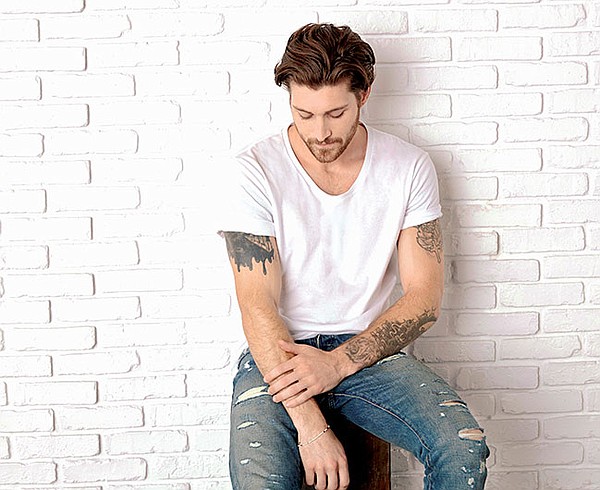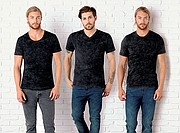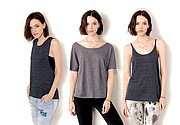BELLA + CANVAS
A Solar-Powered Factory Helps Maintain Domestic Production
Bella+Canvas started out as a company dedicated to making T-shirts in the United States—a business model that hasn’t changed much even as other manufacturers have headed overseas.
The knitwear maker was founded in 1992 by high school (and still) best friends Danny Harris and Marco DeGeorge. The pair, who grew up in Los Gatos, a suburb of San Francisco, launched the company as a private label.
“We were very interested in fashion and design, and at that time there were really no greater companies than Gap, Levi’s or Esprit. They were all in San Francisco. There was no greater inspiration for us,” Harris said.
Today, Bella+Canvas has more than 400,000 square feet of manufacturing space and 800 employees in Commerce,
Calif., an industrial area southeast of downtown Los Angeles.
In 2008, Bella+Canvas—using state subsidies—got rid of its lightbulbs and converted to a solar-powered manufacturing facility that includes bi-weekly yoga classes and workout facilities. Last year, Harris and DeGeorge added electric-car chargers.
“It’s who we are as a culture,” Harris said. “I eat organic, and so does my business partner. We adapted our company to our lifestyle.”
“It’s important that our customers and employees know with confidence that we do everything in an eco-conscious, sustainable and responsible way,” he added. “We have a recycling program that leaves our manufacturing with almost zero landfill. These are just a few things we do to create a positive environment for employees to thrive in.”
On its website, Bella+Canvas makes a point to tout its “Made in LA” credentials, which accounts for about 10 million units a year, but the company declined to specify what percentage of its merchandise is domestically made. Bella+Canvas shirts retail on its website for about $16.50 to $44, depending on the style and sleeve length. The company also manufactures sweatshirts, cardigans, dresses and knit pants.
Analysts said this kind of domestic production has some appeal for a segment of the “millennial” market, but it doesn’t attract everyone.
“Examine their competition, which is American Apparel,” said Ilse Metchek, president of the California Fashion Association. “There has yet to be any intrinsic value as per the consumer for the ‘eco’ part or the ‘Made in USA’ part.”
She said consumers will only pay a little more for “Made in USA” labels, such as $22 if it’s only $2 over the price of a foreign-made shirt. If it’s more than 15 percent above retail, it’s a deal killer.
“There is a certain segment of our millennials who that matters to in areas like LA and New York—but not in the middle of the country and not in Florida,” Metchek noted.
Frank Kaufman, a Moss Adams LLP partner who focuses on retail and apparel sectors, agreed with Metchek about the economic viability of American made and eco-sensitive manufacturing. But he said if Bella+Canvas has “been around since 1992, they must be doing something right.”
Harris will tell you that “something right” is Bella+Canvas’ wholesale business, which he says saturates a large part (as a privately held company, Bella+Canvas doesn’t release sales figures) of the surf-and-skate industry as well as specialty T-shirts for companies and organizations.
“Mostly, where we sell is to the wholesale printable industry—to screen printers and embroiderers who make shirts for fraternities, sororities and companies. Surf-and-skate brands like Oakley, Roxy or Rusty all use Bella+Canvas,” Harris said.
He compared Bella+Canvas to the Italian manufacturer responsible for 80 percent of the world’s eyewear brands, “We’re like the Luxottica of the surf-and-skate industry.”
In addition, Harris and DeGeorge make private-label shirts for retailers and brands as well as sell their various lines of combed and ring-spun T-shirts on their website (www.bellacanvas.com) and to about 800 boutiques.
But the company’s bread and butter sits in a warehouse full of 40 million “off-the-shelf blanks” (basically, a complete T-shirt in each of Bella+Canvas’ fits, bodies and colors). They are available for customers who want to do their own printing and embroidery or to replenish exhausted stock quickly or rebrand as their own. The blanks even include tearaway labels to make it easier for clients to re-brand.
“Rather than someone saying, “Here’s our specs”—odds are we’re a lot more sophisticated than they are. We’re a larger company than the retailers or the brands.They can take our blanks,” Harris explained. “We have customers, like very high-end retail brands or surf-and-skate brands, as well as technology companies and some of the smallest start-up design companies. If they want to put a design on a shirt and it sells out, they are able to jump in and use our label or put a label in it.”
To this day, Bella+Canvas is solely owned by the two lifelong pals who started it. And they have no plans to alter that business plan or the way they do business.
“We dress somewhere around a quarter of a million people every single working day,” Harris said. “We want to do things our way and not just focus on the next quarter but on the next 50 years.”
























